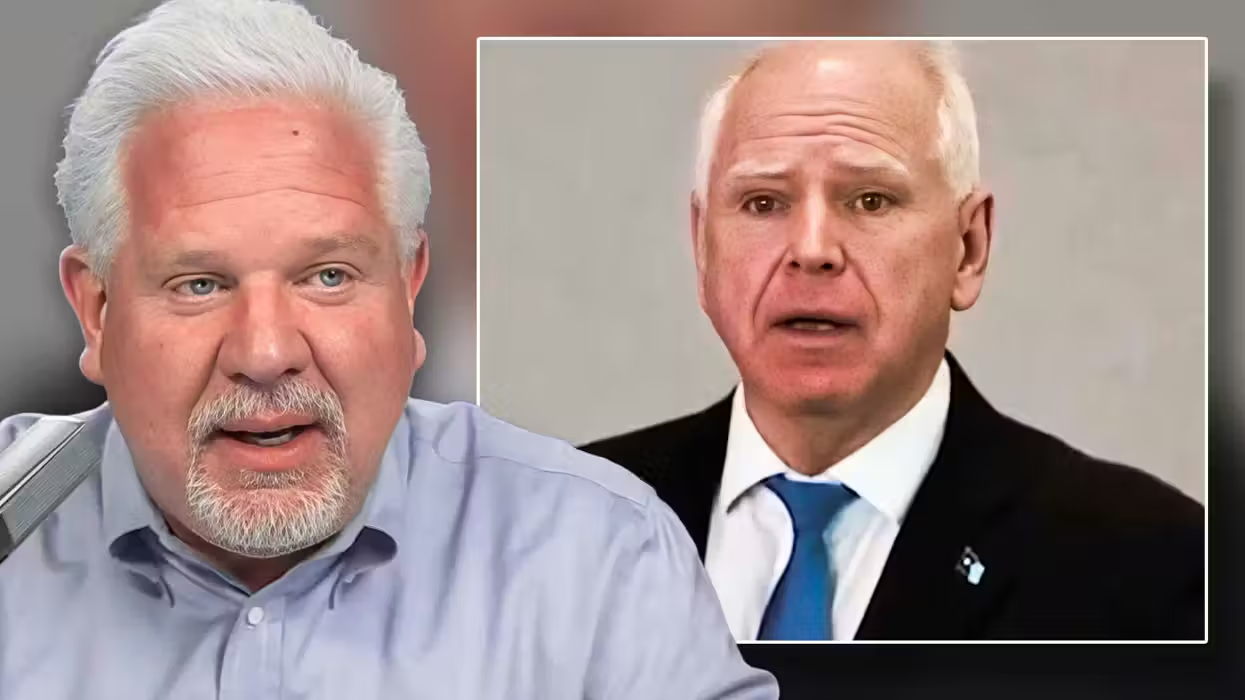
© 2025 Blaze Media LLC. All rights reserved.
Rep. Paul Ryan's agenda in his own words, from his new book, "The Way Forward."
2012 Republican Vice Presidential nominee and Chairman of the House Budget Committee Paul Ryan has a new book out titled "The Way Forward," in which he weaves his personal story into a treatise on political philosophy and policy prescriptions that may very well serve as a trial balloon for a 2016 presidential run.
Below we summarize the eight planks of Paul Ryan's prospective presidential platform in his own words, which represent "an application of the conservative idea of government's role made real through concrete public policy," intended to make "government simpler, smaller, and smarter so that it can effectively fulfill its proper role again and help Americans recover the promise of our country."
1. Entitlement and Health-Care Reform
 (Image Source: Investor's Business Daily)
(Image Source: Investor's Business Daily)
Replacing Obamacare
"I would repeal Obamacare and replace it with market-based, patient-centered reforms. For able-bodied Americans under the age of sixty-five, we would replace the inefficient tax treatment of employer-provided health care with a portable, refundable tax credit that Americans could use to purchase coverage and get care.
...each person should have a tax credit that is theirs to take with them regardless of their employment status. You can then take your plan with you from job to job--and hang on to your insurance even when a job might be hard to find...For workers who get their coverage through their employers, their tax credit would go to their Health Savings Account to help pay for any out-of-pocket costs, like premiums and deductibles--or they could buy separate insurance, if they wish. And everyone else would now have a tax credit they could use to purchase insurance in the private market, where insurers would compete for their business.
Soon, health care would start to look like a real market with transparent prices, easy access to information about quality, and more choices. Americans will be empowered to choose the insurance plan that offers them the best quality for the lowest cost. When millions of Americans are making their own health decisions, it's going to drive the cost of health care down. Instead of top-down price controls imposed by bureaucrats, we're offering bottom-up competition driven by millions of customers.
...What's more, the alternative I'm proposing doesn't come with any of the unpleasant feature of Obamacare. There are no mandates, fees, or penalties. And you can use your tax credit to choose the plan that works best for you rather than one that satisfies a government bureaucrat in Washington."
Medicare Premium Support
"...my plan reforms Medicare using an approach known as premium support. Future retirees would receive financial support for the plan of their choice, with more support available for the poor and the sick. This is similar to how federal employees now get their health-care coverage. Under my reforms, seniors could choose to stay with a traditional fee-for-service plan, similar to Medicare today, or they could select from a list of comprehensive private policies that deliver all of their traditional Medicare benefits in one plan.
My approach doesn't raid $700 billion from Medicare to get up and going. In fact, it keeps those savings for Medicare. And with additional support for those with preexisting conditions, people can get affordable coverage regardless of their health status."
Medicaid Grants to States
"Just as we need to turn the power to make choices back to workers and seniors in health care and Medicare, we also need to give states more freedom and flexibility to decide how to best deliver benefits through Medicaid...We should send federal Medicaid dollars back to the states through per capita grants. This approach gives each state the flexibility to tailor its Medicaid program and implement it in ways that better address its citizens' unique needs. Today, the care that Medicaid patients receive is often substandard, in part because it's subject to the demands of federal bureaucrats. Under these reforms, states will be able to give their citizens better options, improved outcomes, and greater access to quality care."
Social Security Tinkering Plus Retirement Accounts
"...a sensible reform would slightly pare back the growth in future benefits for higher-income people and slowly increase the retirement age to reflect longevity over time. This should be done without affecting the benefits of anyone in or near retirement...I would propose the creation of optional personal retirement accounts. That way, younger workers can invest in their own account, which will be managed by Social Security for their retirement and can deliver a much better rate of return.
...Your account would have safeguards so that the level of risk you can assume is dialed back as you get closer to retirement age. That not only ensures that your money will be there for you in retirement; it also means you actually own your retirement fund and can pass it on to your family."
2. Tax Reform
[sharequote align="center"]"[N]o business or family would pay more than 25 percent of their income to the federal government"[/sharequote]
"A simplified tax code would narrow the number of rates for individuals and families from seven brackets down to two. Low- and middle-income families would pay a marginal rate of 10 percent, with a tax rate of 25 percent for anyone earning more...Any existing [tax] preferences should prioritize working families struggling to make ends meet.
I would also get rid of the alternative minimum tax...
We must also reduce our corporate tax rate..My colleague Dave Camp, the chairman of the House Ways and means Committee wants to reduce the corporate tax rate to 25 percent, a figure that would make us much more competitive internationally. He also proposed exempting 95 percent of the profits made by the foreign subsidiaries of U.S. companies from taxation. That would encourage companies to bring their profits back to our shores and reinvest them here.
Taken together, these reforms would mean that no business or family would pay more than 25 percent of their income to the federal government. And by lowering rates and closing loopholes, tax reform can make the system fairer for all without increasing the deficit. In fact, this kind of reform would grow the economy and help shrink the deficit."
3. Ending Cronyism and Corporate Welfare
[sharequote align="center"]"Capitalism and cronyism are not compatible"[/sharequote]
"Conservatives think problems are better addressed from the bottom up, through a trial-and-error process of knowledge discovery and continuous improvement that is best embodied by an efficient market. That approach should also be the organizing principle of public policy, and that kind of process is possible only when competition is open and fair. It cannot coexist with cronyism for the wealthy and well connected.
Republicans should be staunchly opposed to corporate welfare in any form, and to the cozy relationships between big government and big business that undermine the dynamism of our economy.
House Republicans have made efforts in this regard in recent years. Our budgets have sought, for instance, to end the bailouts of big banks that are only perpetuated in the Dodd-Frank financial-regulation law, to kill the green-energy slush fund and other corporate subsidies to the energy industry, and to eliminate $7 billion of corporate welfare in the Department of Commerce. There is much more to be done on this front, in terms of both tone and substance...Capitalism and cronyism are not compatible, and it's time the Republicans made it much clearer to voters that we are the party that stands for a competitive economy suitable for growth."
[instory-book ISBN="9781455557561"]
4. Regulatory Reform
"Federal agencies are now issuing rules at an alarming rate--with very little oversight. What's worse is that citizens have very few ways of appealing agency regulations. Today, the vast majority of regulatory cases are handled not by a judicial court but by an administrative court tied to an agency...One solution to this problem is the Regulations from the Executive in Need of Scrutiny (REINS) Act, which would give Congress greater oversight over the regulatory process and reestablish its primacy as the nation's lawmaker. essentially the act says that if there is a federal rule that would cost the economy more than $100 million a year, then the House and Senate must look at it and approve it before that rule can go into effect."
After discussing the lengthy wait for federal permits for drilling, mining and fracking, Ryan writes: "Going forward, we should ease the regulatory burden on the economy, and the best way to do that is to bring meaningful cost-benefit analysis back into the system, reconnect the law with the lawmakers, and restore the balance between the branches of government."
5. Immigration Reform
Following a section on Rep. Ryan's belief that immigration is important to America's story and success, and that immigrants are needed to make up for the declining birth rates among American citizens, which could strain the country's ability to fund entitlements, Ryan writes:
 US Border patrol agents keep watch outside the entrance to the US Border Patrol facility in Murrieta during an anti-immigration protest in Murrieta, California, on July 7, 2014. Protestors are opposing the arrival of buses carrying undocumented women and children migrants for processing at the Murrieta Border Patrol Station. Deportations of illegal migrants crossing the US border are being stepped up, a top Obama administration official said on Sunday, defending the White House's handling of a flood of undocumented children. (Image Source: AFP PHOTO / Robyn Beck ROBYN BECK/AFP/Getty Images)
US Border patrol agents keep watch outside the entrance to the US Border Patrol facility in Murrieta during an anti-immigration protest in Murrieta, California, on July 7, 2014. Protestors are opposing the arrival of buses carrying undocumented women and children migrants for processing at the Murrieta Border Patrol Station. Deportations of illegal migrants crossing the US border are being stepped up, a top Obama administration official said on Sunday, defending the White House's handling of a flood of undocumented children. (Image Source: AFP PHOTO / Robyn Beck ROBYN BECK/AFP/Getty Images)
"First, we must secure the border and enforce the laws we have on the books...To enhance security, we should also set up an effective visa-tracking program. Today, an estimated 40 percent of the undocumented immigrants in our country came in on a visa and then stayed after it expired. We need a system that can effectively track visitors entering and exiting the country. And we need an "e-verify" system that gives employers the ability to instantly confirm an individual's immigration status electronically.To secure the border, we also need to set up a guest worker program that allows immigrants to take jobs that are not being filled by Americans...people who can contribute to our economy shouldn't have to jump the fence; they should be able to come through the front door. If an employer can't find American workers to fill open jobs, they should be able to hire immigrants on a temporary or seasonal basis.
Once an independent third party has verified that specific border security and enforcement conditions have been achieved, then we need to give those who are here illegally a chance to get right with the law...We can't allow amnesty; that is unfair, corrodes the rule of law, and just creates a magnet for more illegal immigration. Nor are mass deportations a realistic solution...
The process should take the form of probation, or deferred adjudication, similar to how our legal system currently deals with some who have broken the law. Undocumented immigrants who come forward should be given an opportunity to gain a probationary legal status with specified conditions, which would include admitting to unlawful entry, paying a fine, paying back taxes, submitting to a criminal background check, learning English and civics, and staying off of any form of public assistance.
If an independent party verifies that the border and interior security reforms have been accomplished, and if the terms of probation have been satisfied, then probationary immigrants may leave probation and receive nonimmigrant work visas. After another period of time, an immigrant who wants to get a green card would go back to the end of the line and apply--just like everybody else. That means legal status must be earned. They won't be rewarded for breaking the law and they won't cut in line ahead of those who have played by the rules. This solution is fair, realistic, responsible and enforceable."
6. Sound Monetary Policy
"In pursuing reform, a bill introduced by my friend and colleague, Congressman Kevin Brady, is a good place to start. The Sound Dollar Act does away with the dual mandate and restructures the Federal Reserve so that its sole focus is on price stability and maintaining a sound currency. We need to transition towards a rules-based monetary system anchored in certainty and predictability."
7. A Twenty-First-Century National Defense Strategy and Foreign Policy
[sharequote align="center"]"America must never be reduced to just one of many voices in the crowd."[/sharequote]
After discussing the various challenges facing America's national security, and his belief that the left is promulgating foreign policy without an underlying coherent strategy and worldview, seeking to cut America's defenses without basing budgeting on the needs of our armed forces, Ryan writes:
As the administration puts the screws to the Pentagon in order to fit an arbitrary number in its budget, these are the lives that are being affected by those bean-counter decisions. To do right by the men and women who have sworn to protect our freedom, we need a clean break from the budget policies and feckless foreign policy of the last six years.When it comes to reforms in this area, the overriding principle is what's simple: Providing for the national defense is the first and primary responsibility of our federal government. Our policies and budgets must serve that goal.
With that in mind, we can make our military smarter by adapting a defense budgetary policy that is strategic. First, we need to right-size the Department of Defense's civilian workforce. Today, about 800,000 civilians work for the DoD, joined by another 700,000 contractors. That means there's just about one civilian DoD employee or contractor for every active-duty soldier, sailor, airman, and marine. To scale back this workforce to a level that better suits our current needs, we should hire one worker for every three retirees with priority for new hires given to positions that are critical to national security. That policy would allow us to trim bureaucracy, and preserve funding for training and equipment for our war fighters, like the Warthog.
America must never be reduced to just one of many voices in the crowd. If we don't fulfill our role in the world, then the vacuum we leave behind will be filled by leaders who do not share our values. That will only create more violence and instability. America must be out front, protecting our interests, our allies, and our values. To do that, we need a defense strategy and foreign policy capable of leading the world in the twenty-first century--and we need the financial resources to back it up.
8. Anti-Poverty Agenda
 Shuttered businesses line a downtown street November 20, 2008 in Detroit, Michigan. (Getty Images)
Shuttered businesses line a downtown street November 20, 2008 in Detroit, Michigan. (Getty Images)
Rep. Ryan believes that in order to combat poverty we need to change culture.
He describes an America in which today we are increasingly not all driven by the same values, stratifying on the basis of class, in a section that brings to mind some of the themes of Charles Murray's "Coming Apart":
...we're becoming more of a class-based society--and those classes increasingly seem less like permeable boundaries that can be easily transcended. We are now living in a society where people are isolated from each other economically and culturally and geographically. I believe overcoming that isolation must be our focus...We need to find ways to bridge this divide and renew the spirit of hard work, family, and responsibility...In our struggle to renew the culture, we need to think about how we reinvigorate our founding values in a way that brings people together--and doesn't give insult to any person or group. Instead of pitting people against each other, we need to invite everyone in. We need to move from a state of isolation to one of participation, reintegrating our fellow citizens who live in places that haven't experienced all of the blessings of the American Idea.
Congressman Ryan argues that government and civil society have a role to play in changing the culture and in particular combatting poverty. He writes: "Before we make government policy, we should look at all the good that is being accomplished by civil society...The federal government has a role to play, but it's a supporting role, not the commanding one. Its job is to give people the resources--and space--to thrive."
Ryan alludes to two principles of Catholic teaching, "subsidiary" and "solidarity" as a means of illustrating how he believes such social ills should be handled. Ryan explains:
Subsidiarity...holds that problems should be handled at the lowest level at which it's possible to achieve a successful resolution...If possible, government shouldn't assume tasks that can be better handled by families or communities or other civil society institutions...subsidiarity counsels that the federal government support the work of anti-poverty groups and not co-opt that work or crowd it out...[solidarity means] simply that we have duties to our neighbors, duties that can be fulfilled from the local all the way up to the national, depending on the circumstances. When goals can be achieved at the local level, that should be preferred, since those closest to the problem can best address the need. However, some challenges cannot be fully resolved by a state, a locality, or citizens working together in civil society In those cases, we have a responsibility to act together through the federal government and bring national resources to bear in order to achieve the common good.
He concludes:
The challenges of homelessness, poverty, and upward mobility demand collaboration between our citizens and our government. When local, state, and federal government as well as civil society all work together, in light of the principles of both solidarity and subsidiarity, we can best meet these challenges. Our task now is to reform our federal programs so that they shore up the work under way in our communities and provide an on-ramp to opportunity.
Ryan also outlines a series of reforms, beginning with those intended to streamline the welfare system. He believes we should
...empower states to try a different approach to creating upward mobility for the poor. The federal government would grant states the flexibility to collapse several means-tested programs into one overall payment that would be paired with personal case management to directly benefit the recipient...individuals will get a dedicated case manager or counselor who will help them put together a plan for getting back on their feet with measurable goals, including ultimately graduating from the program and into self-sufficiency.Every recipient, except the disabled and the elderly, must be employed or looking for work. The counselor will help the client budget their money and find a job, and they will provide a measure of responsibility and accountability.
Ryan asserts that the Earned Income Tax Credit should be delivered monthly instead of annually, "so that people can see the value of their work in every paycheck they earn."
Welfare reform according to Ryan should further ensure that people are not disincentivized from marrying:
Right now, our welfare programs give a couple with a child more support if they do not marry than if they do. Under Obamacare, some couples have a better chance to qualify for a federal health-care subsidy if they stay single or get divorced. We can promote marriage--and reduce poverty--by removing the penalties for getting married and taking care of our kids.
Ryan also argues that education is crucial to ending the cycle of poverty, advocating school choice, while noting that "the federal government can help facilitate rather than frustrate the development of school-choice programs--for instance making it easier for federal dollars to follow students and by incentivizing states to give parents real options."
For those who have already risen through the education system, Ryan believes that the federal SKILLS Act program can be used to help job seekers develop essential marketable skills they may not have otherwise developed:
The Act would take the $18 billion we spend annually on job training and put it to better use. It makes our job-training programs easier to navigate by streamlining thirty-five existing federal programs and creating a flexible Workforce Investment Fund. Some of these funds would be set aside for the specific task of helping people who have unique challenges in finding employment, including at-risk youth.The SKILLS Act would also give states more power to tailor job-training programs to their local workforce needs, and it would make it easier for job seekers to take advantage of this training immediately so they can enter the workforce that much more quickly. It would also give employers the chance to set up training programs themselves, which assures workers actually get the skills they need to land a good job. And for those who were failed by the public school system, the SKILLS Act would help them acquire basic math and reading proficiency.
Lastly, in order to combat the rising costs of education, Ryan argues that the federal government needs to shrink its role:
...the solution is to better enable a working market to form. This needs to involve a combination of student-loan reform (PLUS loans, which allow parents and graduate students to borrow unlimited amounts up to the cost of tuition, are particularly counterproductive) and accreditation reform to enable students and parents to chose from a far greater range of options and to exercise a powerful consumer pressure to drive costs downward while improving the quality of American higher education.
Want to leave a tip?
We answer to you. Help keep our content free of advertisers and big tech censorship by leaving a tip today.
Want to join the conversation?
Already a subscriber?
Ben Weingarten is a writer, commentator, and editor at large at RealClearInvestigations. He is a senior contributor at the Federalist and writes columns for Newsweek and the Epoch Times.
Ben Weingarten
Ben Weingarten is a writer, commentator, and editor at large at RealClearInvestigations. He is a senior contributor at the Federalist and writes columns for Newsweek and the Epoch Times.
more stories
Sign up for the Blaze newsletter
By signing up, you agree to our Privacy Policy and Terms of Use, and agree to receive content that may sometimes include advertisements. You may opt out at any time.
Related Content
© 2025 Blaze Media LLC. All rights reserved.
Get the stories that matter most delivered directly to your inbox.
By signing up, you agree to our Privacy Policy and Terms of Use, and agree to receive content that may sometimes include advertisements. You may opt out at any time.






